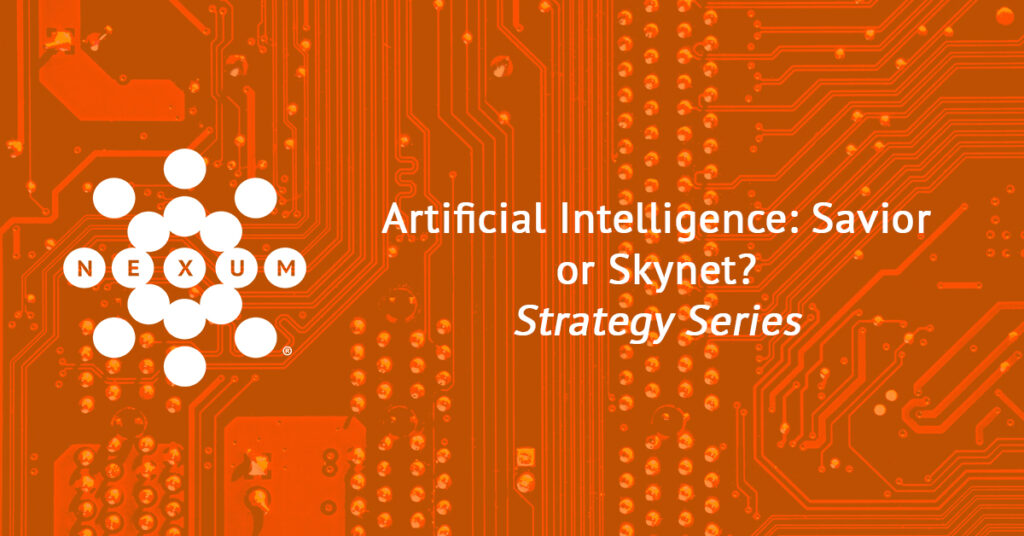
Artificial Intelligence – Savior or Skynet?
Strategy Series

Written By: Ron Temske, VP of Strategy
Connect with Ron on LinkedIn
For the past few months, it’s been difficult to look anywhere and not find a discussion about OpenAI’s ChatGPT, the latest technological phenomenon gathering tremendous attention. While much of this attention is warranted, the technology is simultaneously amazing and terrifying.
Before I delve into ChatGPT specifically and my overall thoughts on AI, it’s worth taking a short amount of time to address some distinctions between AI and machine learning (ML).
Artificial Intelligence Vs. Machine Learning
Artificial intelligence (AI) is a broad field that encompasses many different techniques, including machine learning (ML). Machine learning is a subset of AI that involves training computer algorithms to make predictions or take actions without being explicitly programmed to do so. In other words, AI refers to the overall concept of machines being able to perform tasks that would normally require human intelligence, while ML is a specific method for achieving AI.
ChatGPT is a state-of-the-art, deep-learning-based natural language processing model developed by OpenAI. It is a variant of the GPT (Generative Pre-training Transformer) architecture, which is trained to generate human-like text. ChatGPT can be fine-tuned for a variety of natural language processing tasks such as language translation, question answering, and conversation generation.
AI and ML have been used in security products for some time. We can train systems to detect (and, in many cases, respond to) threats more effectively than a team of humans. While this has been a tremendous boon for security applications, there’s always another angle. Do you want to guess what you can do with a system that excels at detecting abnormalities and fakes? You can generate your own abnormalities and fakes!
Concerns About Artificial Intelligence
One of the most common concerns about AI is its potential impact on jobs and the workforce. Many experts predict that automation and AI will lead to significant job losses in certain industries, as machines and algorithms become capable of performing tasks that were previously done by humans. Another concern is the potential for AI systems to be biased or to perpetuate existing societal inequalities. AI systems are only as unbiased as the data they are trained on, and if the data contains biases, the AI will also be biased. There is also concern that AI systems could be used to perpetuate surveillance, or to make decisions that have serious consequences, such as in healthcare or criminal justice, without sufficient human oversight. Furthermore, the potential for AI to be weaponized, and to be used in ways that are harmful to humanity is also a concern. The lack of transparency in the decision-making process of some AI systems and the difficulty in understanding how they arrive to certain conclusion, also raises concerns about accountability and the possibility of misuse.
With so much focus in the news about misinformation and disinformation, it is concerning that these sophisticated systems have the potential to create fabrications that may be difficult or even impossible to detect. For example, I’ve seen AI-generated videos purporting to be footage from the conflict between Russia and Ukraine, but they were fake. In our modern culture, drama sells. And fake drama sells just as well, or sometimes even better, than actual events.
Another area of concern is bias. Whether this bias is “hardcoded” by the designers or learned behavior, it’s certainly an area that needs greater scrutiny. As a thought experiment, I ran multiple tests, asking ChatGPT the exact same question each time, but changing the subject of the question. I received widely divergent responses based on the political leanings of the subject despite the question being identical.
Benefits of Artificial Intelligence
Despite the concerns, there are many potential benefits of AI that make it a valuable area of investment. One of the most promising benefits of AI is its ability to improve efficiency and productivity across a wide range of industries. This can help to create new jobs and economic growth, while also making products and services more affordable for consumers. Additionally, AI has the potential to improve healthcare by enabling doctors and researchers to analyze vast amounts of medical data, identify patterns and make more accurate diagnoses. AI can also be used to improve safety, for example, by monitoring and analyzing sensor data in order to detect and prevent potential accidents. Finally, AI can be used to improve the quality of life for people around the world by enabling more accurate predictions, more effective decision-making and more efficient use of resources. Overall, investing in AI can lead to many benefits for society and the economy. Therefore, continued investment in this area is critical in order to realize these benefits and to address the concerns that have been raised.
By the way, if you’re wondering why some paragraphs in this post are italicized, those were all created by ChatGPT directly. What’s the point in writing a blog about AI if you don’t use it to create part of the blog?
What are your thoughts on this topic? I’d love to hear more opinions on this and how you’re using ChatGPT (or other AI systems) for business or just for fun. Connect with me on LinkedIn or use our Talk with an Expert form and let’s discuss.
Check Out More Resources

Juniper EX4000
Nexum’s, Allyn Crowe, breaks down what sets the latest EX4000 series switch apart—powerful PoE, multigig support for next-gen Wi-Fi, and faster performance. With quick boot times and seamless upgrades, it’s a smart choice for future-proofing networks.

Juniper Announces Wi-Fi 7 Access Points
Nexum’s engineering team highlights Juniper’s new Wi-Fi 7 AP47 as a game-changer, offering faster speeds, quad radios, and enhanced IoT capabilities. With dual 10Gbps interfaces and AI-driven Wi-Fi 7 support, these access points are designed for cutting-edge network performance.

AI-Native Now
Join Juniper Networks on June 5th for a LinkedIn Live exclusive discussion on “Leveraging AIOps for Maximum Impact.”

